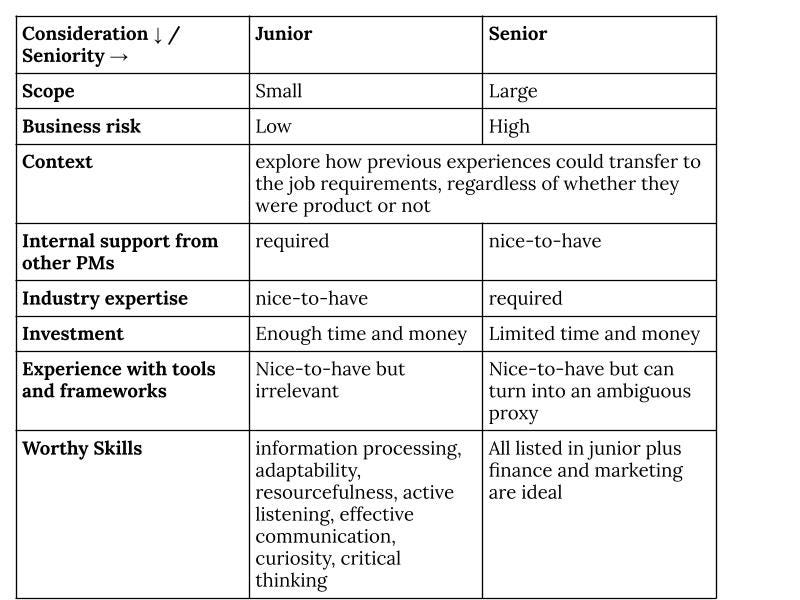When to hire a junior vs a senior product manager?
Building a table for a complex problem that doesn't fit a table solution
✍ This is an opinion piece rather than a prescriptive analysis. Why mention it? Because if you have a different opinion or want to expand on mine, I wholeheartedly welcome and expect it.
One of the community members asked the question in the title recently and I volunteered to answer with my views. Out of the bat, the questions that crossed my mind were:
What scope and impact are they expected to be responsible for?
How critical is industry specific expertise?
What kind of support are they provided?
In what stage of the lifecycle is the product?
Come join me as I explore these in a bit more detail.
Scope and Risk
Typically scope that considers a smaller set of features or products that are meant to serve internal teams or a secondary/tertiary target group allow for risking hiring someone with less experience that can make more obvious mistakes than an experienced person. Notice I say “more obvious” mistakes as I don't want to imply people with experience don't make mistakes. They just make different ones and learn faster from them. But back to scope: The larger the scope or the more critical to the sustainability of a business, the less you want to risk having someone with little experience whose decisions and actions may have a negative impact on the business bottom line.
Context matters
The problem with this criteria is that experience tends to be very context based and what worked for a person in a particular company with a particular product or market may not necessarily translate into useful experience for another product or market or company. An element that complicates looking at individual experience it's understanding the teams or internal company context in which they achieved previous successes which may overlook at the role and dynamics that they played in, the interaction with other roles and decisions inside the company, like support from the exec team or the support from other product team members, or enough budget to experiment or having specific roles that made their workload lighter allowing them to focus on the more impactful things.
Industry expertise
This brings me to the second point to consider which is the industry in which you are where seniority in a specific area might be more important than product management specific experience. For example, if we talk about a software used to analyze data extracted via nano robots to diagnose people's cancer, in this scenario experience in the areas of diagnosis and nanotechnology will be more important than knowing how to build a customer journey map where you can have a complementary role. These roles can be supported with specific tools or frameworks to bring together the specific industry knowledge and transform it into actionable product decisions, even if they've never had a product role.
Investments
Another thing to consider would be (time) investment: if you are looking to build sustainable teams that last for years you might want to invest in juniors that can learn and grow with you. But if you're looking to rescue a product from running out of business in the next 18 months, you won't be able to afford that.
This brings me to a fourth element to consider which is identifying what resources you have available to invest in the growth and development of your people, and if that investment comes from the time that other team members can invest in one another, e.g. seniors mentoring juniors; or if it comes in the form of financial benefits that employees can use to hire external training and coaching.
What I would avoid
Focusing on specific skills as defined by the tools or frameworks a person knows or has used. While they can be a proxy to understand what kind of exposure a person has had to building products, they can very quickly turn into misjudging a person’s experience.
What truly matters
Instead, I would try to assess a candidate’s ability to listen actively, gather information from different sources, synthesize it, make-decisions based on it and have healthy discussions with different people along the way, such as customers, stakeholders, and colleagues. In my view, all of these are important and critical skills to be a successful product manager and they have not much to do with whether you know how to build a report using Tableau or build a prototype in Figma.
Technical skills worth assessing
In fact, if I were to look at technical skills to understand a product person’s experience, I would focus more on financial and market research skills. Do they understand the difference between allocating a development team to the assets or costs categories of a financial investment and how that impacts the decision of trying to hire 2 new engineers to a team? Can they figure out why there was a spike in product usage in the past week compared to the previous six and uncover it through customer support conversations? Are they able to identify the must-haves and nice-to-haves for a prototype?
All in all, every company or team has to look at their own reality and context, and try to answer the questions about resources, expected impact, support provided, and industry needs. Sadly, the job market is full of copy-pasted descriptions of product manager positions that indicate not a lot of thought is put into this.
___
I confess I am not fond of putting problems concerned with choosing among humans in tabular or checklist forms (useful for more straight forward problems). However, the feedback from the folks of the community who reviewed the original draft of this article suggested I include a table to summarize the points made above. Perhaps some of you would find it useful. Just remember that evaluating humans and their experience is not as simple as checking whether they meet a criteria, like when we choose an electronic devise. Anyhow, here is the same information in tabular form:
It would be up to the people responsible for hiring to decide which of the considerations would take priority when making the final decision of whether to go for a senior or junior.




